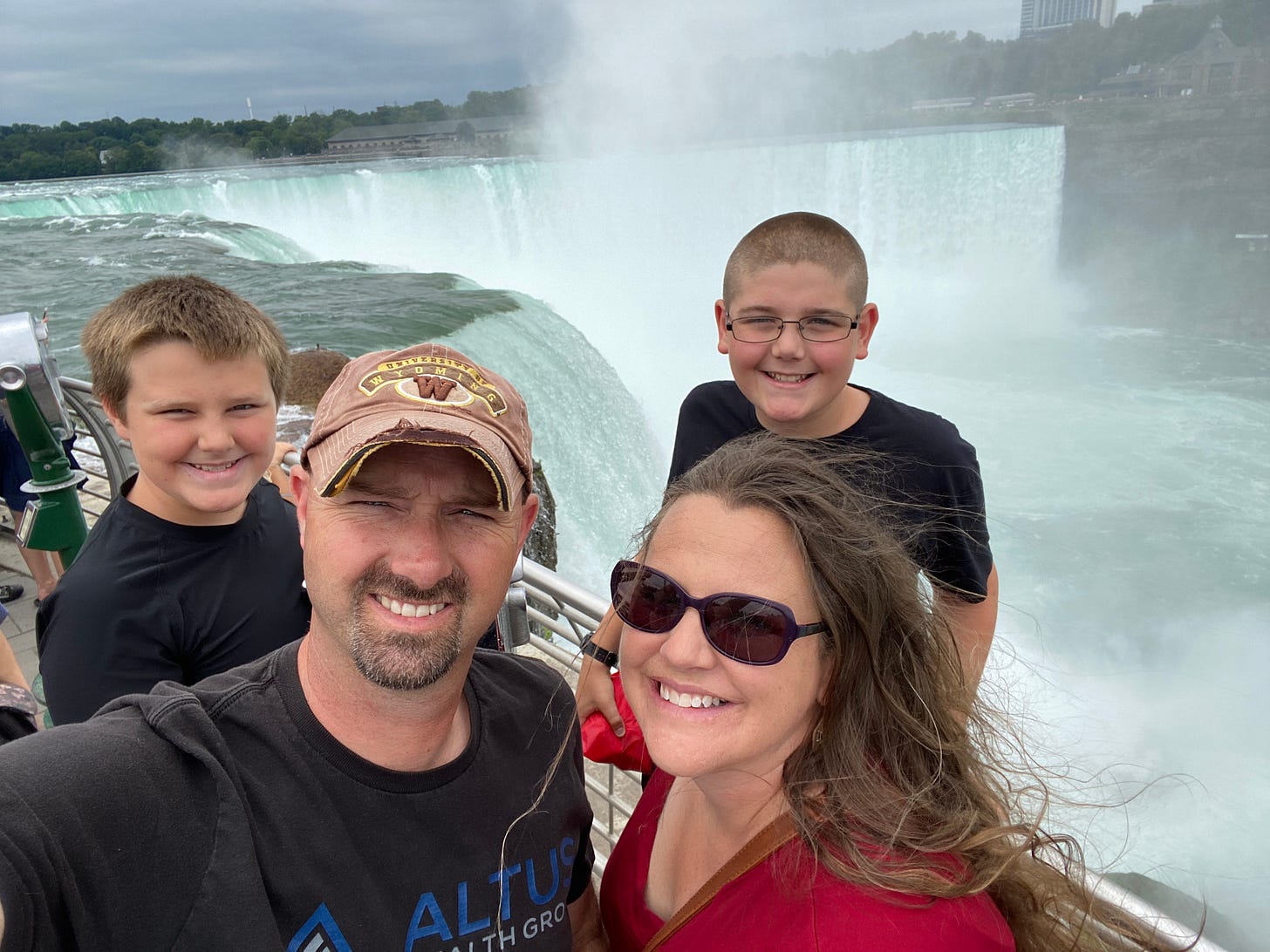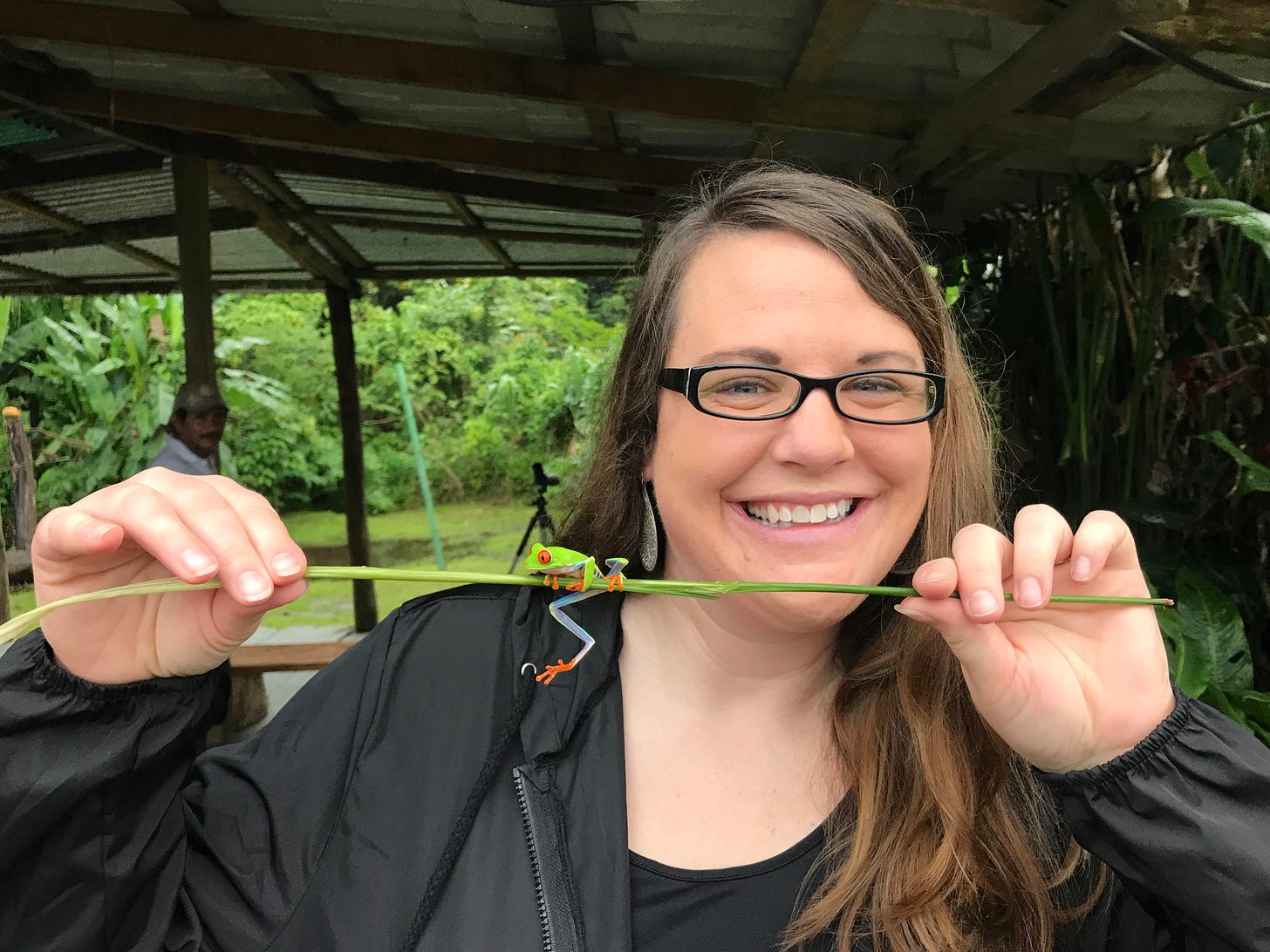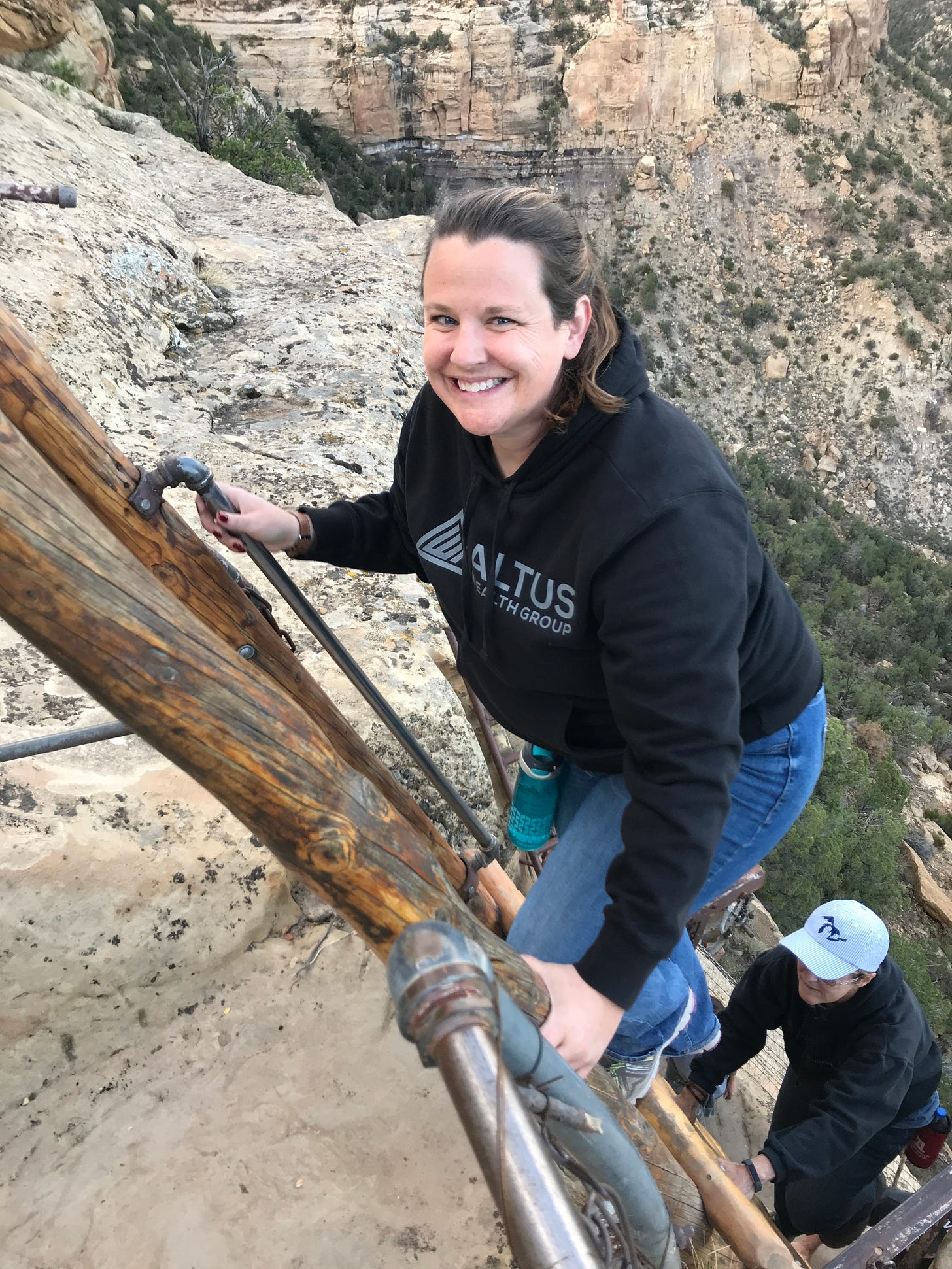Educator series: #4. A former teacher is now a homeschooling expert
She's a homeschooling mom who helps other homeschooling parents
Hello, friends.
I met Amanda Bench through Surf Academy, which her 11-year-old and 13-year-old sons were taking along with Beanie. There’s quite a bit of time to chat at 6:30am while the kids are busy catching/not catching waves. Since I was mulling over the possibility of homeschooling Beanie next semester, I peppered Amanda with questions about everything homeschooling.
Amanda was a teacher in the classroom before she decided to focus on teaching her own children. She first went to college as a chemistry major after having had an amazing chemistry instructor in high school who made the subject come alive. Amanda quickly realized it wasn’t chemistry that she really appreciated, but her teacher’s teaching skills. She switched her major to communications, got a master’s degree in education, and became a public school teacher.
When Amanda’s first son reached kindergarten age, she found the school options around their home not a good fit for him, so she decided to homeschool. Today, she continues to homeschool both her sons, and this has allowed their family the freedom to travel as they learn. They’re here in Costa Rica for a few months, and earlier in the pandemic they traveled to 32 states in their RV.
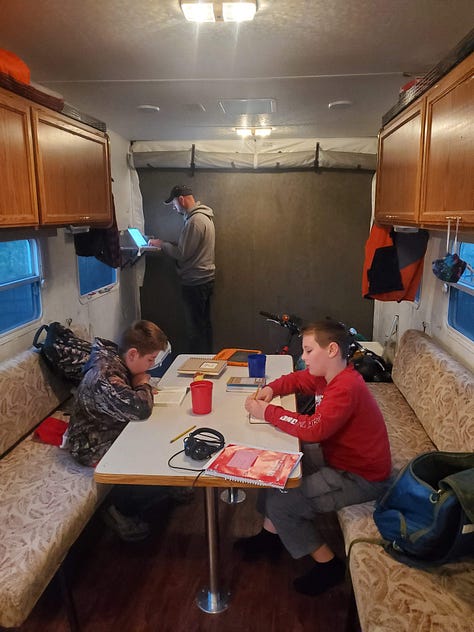
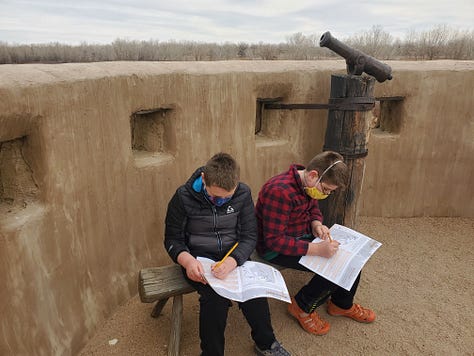
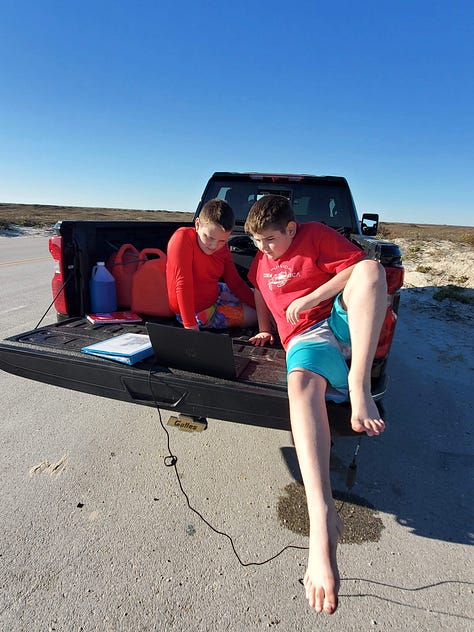
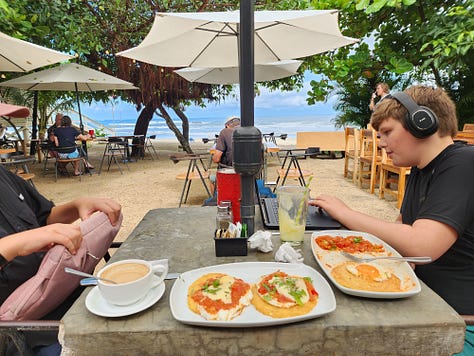

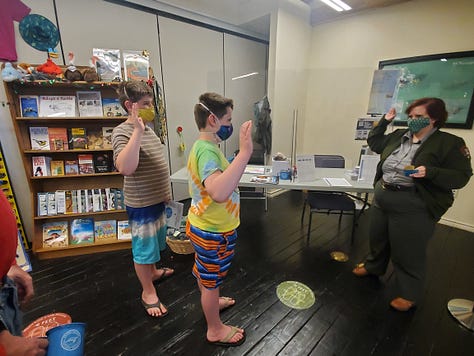
Because of her qualifications as a teacher, she’s also now in demand as a homeschooling evaluator and consultant, helping other families from her home state of Colorado to meet reporting requirements and navigate their homeschooling paths.
If you’ve ever wondered why someone might homeschool, how to get started homeschooling, or if it could be the right choice for your family, read on.
Who do you think homeschooling is right for? And who is it not right for?
If you have the means, you can make it right for any kid because you can always find an expert—for the right price, you can find whatever you need to make that child successful. In reality, most parents don’t have the means to do an infinite number of things.
It helps a whole lot if the family is able to live off one income, right?
For sure. There are a lot of homeschooling families that do have two working parents, but it's very much an organizational juggling act to get it all done.
Do they themselves teach, or do they hire tutors or what?
I think most teach themselves, but their kids have very non-traditional school hours. It may be that they're doing their school work from three in the afternoon to six at night; or Thursday, Friday, Saturday, Sunday; or different combinations that you wouldn't think of as being school time.
You know people who do that?
I know a lot of people who do that, because I do evaluations and consulting for homeschoolers. So I get to peek inside these different ways of doing it.
How would you advise parents who have no experience get started on the homeschooling journey?
Start by figuring out what your thoughts are about education. Are you looking for a replication of a classroom at home or something very different and you need to look at unschooling methods [link to my article about unschooling]? I think a lot of parents don’t know there are so many educational philosophies out there.
Is there a place to start looking at educational philosophies?
Yeah, there are some quizzes you can take to see what educational style fits you [here’s one she recommends, from Orison Orchards].
Once you know what it means if something’s marketed as, for example, a Charlotte Mason curriculum, you may or may not be drawn to it. You don't want to start by looking at curricula first.
So you have to take the big picture view first and figure out your own philosophy before you can look at the nitty-gritty, right?
Yes, otherwise you're gonna be operating totally on trial and error, and there are so many things available. Start with the big picture: what do you want school to look like? What is your philosophy on education and learning? And then from there you can look up the curricula or programs. Sometimes for new homeschoolers, if they’re nervous about it, they may not want to go full-fledged doing all the teaching—it can be overwhelming if you’re not ready for it—so maybe find an all-in-one curriculum. Though in general, all-in-ones are not as strong.
Do you mean online programs like Time4Learning?
There are online programs and there are also packages you can buy that include a math, a science, a history, a reading book for you to teach. It’s all laid out in a schedule of what you do every day.
One of those options might be easier when you’re first starting, and once you feel comfortable you can begin branching out.
The all-in-ones without some component of a live teacher tend to not promote higher level thinking skills—they’re very factual and the output they’re asking for from students is multiple-choice style.
If the family has the means, I really love Outschool. It takes a little bit of digging to find what you’re looking for, because there are so many options [on the site], but if you have the means to set that up for your kid, it’s great. There’s somebody else to teach; it’s not all on you. It’s a little traditional in that you’re still taking on making sure your kid is doing the homework while someone else is doing the teaching.
They have flex classes where you’re watching videos, and they have live classes. My kids like the live classes because they’re more interactive and they also give you a schedule to go off of. I find that’s helpful for new families too.
Outschool has pods where they have some core subjects grouped together, and there are the same kids in those classes, cohorted together. I’ve noticed a lot of families in my kids’ classes travel a lot, so this gives them a bit of consistency and interaction and makes them feel connected.
And you bring in experts to teach too, right? Maybe that’s more of an advanced thing to do, seeking out experts—almost like classical tutoring in the olden days?
That’s a path my family is drawn to; in particular with my husband’s job [as a financial advisor], we’re exposed to people of all different backgrounds and trades, who our kids can connect with and learn skills from.
Have you pursued that? Are people receptive to being approached to teach?
Not on a full-scale with home classes, but Keegan has been interested in the nonprofit homeless assistance sector. We have a good friend who runs a homeless nonprofit in Colorado Springs, and he’s been great about answering questions. He had Keegan work on a project, building a little library to go outside one of their complexes. I think in the upcoming years we’ll utilize that more as they start having more defined interests and specific possibilities for career paths.
For the parent, not just the academic part but all of this—it’s so much legwork to give them the whole education. I know there’s legwork even if you were to send them to school, but it’s overwhelming hearing this and thinking, “This is all stuff I’d have to do if I homeschooled.”
There are a lot of pieces. There are also a lot of pieces I don't have to do. I don't have the bake sales, I don't have the PTA meetings. I don't have to sit in the car pickup lines. We don't really do back-to-school shopping. But it is a commitment. You have to be committed to this.
There are families that unschool, and because they're unschooling, for some of them it’s less time-consuming because they aren't approaching education the same way. That's not true of all unschoolers—unschooling has two camps. Some unschoolers are very strategic in how they unschool and that’s almost more work. I feel like that’s something I would like to do but never would cuz I couldn’t give that level of attention and detail to setting up materials for the kids to become interested in. I’m much better—if they have an interest already—getting books for them, helping them find good resources.
It goes back to being intentional—making sure you’re out in the community or going to museums. Right now we’re in Costa Rica and we’re going to the beach; we might see something at the beach and go home and look it up.
Do you find after all these years of homeschooling they do it themselves or do you still have to say, “Oh, let's look up this thing.”
For the most part, they do that now. We do a lot of learning together though. I love learning, so that's why I get so excited about homeschooling because I get to do it with them. I feel like I've learned so much more knowledge homeschooling my own kids than I ever did in all of my education. But it's also that we’re more interest-led. There are [curricula] we follow, but I'm also okay with putting that away if we get really excited about learning something else.
That confidence probably comes with your experience, both as a professional and as a homeschooling teacher. I feel in the beginning I’d be like, “Okay, we have to follow this schedule. “
I think that is common. I’d say if you can stick homeschooling out to year three, that’s when people tell me they're not bound to the curriculum anymore.
Another aspect of homeschooling that many people wonder about is socialization. And again, it's something that I know people are successful at, but it seems like it takes a lot of effort, especially if you're traveling.
What's interesting is I never felt like the social piece was hard. It was just time-consuming, but it wasn't difficult to find a community. We were stationary in Colorado; living outside of town, it was just a matter of driving. I don’t think the kids ever felt they were lacking [socialization] there—they have really good friends.
Here in Costa Rica, worldschooling, it’s been a lot more challenging. There’s just not a homeschooling community here, but there are other places with homeschooling communities and it may be easier to tap into social experiences and homeschooling classes then.
You have to be more intentional with worldschooling and research ahead of time where the communities are.
How did you transition from teaching at schools to homeschooling your kids?
Our oldest was getting close to kindergarten and that's when we started our research of where we were gonna send him to kindergarten. We live about an hour from the city, so our local schools are pretty limited. We just don't have a lot of choice.
There are three schools within about a 15 minute drive, and everything else is about an hour away. We weren’t happy with the three choices. Our son had taught himself to read at three-and-a-half, and having been a teacher, I knew what the curriculum is for kindergarten and it was not going to engage him. We had already seen with the little bit of preschool he had done that when he was bored, he turned into a stereotypical little boy and got naughty.
I didn't want school to be a place where learning was equated to being in trouble, and that was sort of the path I saw. The school system where we lived just didn't have any alternative options; they couldn't come up with any plans that would further his education—only ways to manage him.
That's when we thought, ‘Are we gonna drive our kindergartner an hour each way to school?’ There were some different programs like Montessori that maybe would have worked. We just couldn't foresee two hours in the car every day with a five-year-old.
That's how homeschooling came about for us.
Now you’re also a homeschooling evaluator for other families. How did that happen?
Colorado law requires homeschoolers to either take a standardized test or have a licensed teacher with a master's degree evaluate them every other year to be in compliance. It started when friends who knew that I had this background asked me if I would do an evaluation for their child so they didn't have to do the standardized testing.
Do you think you’ll ever go back to teaching in the classroom?
I still have that interest and that passion, but we really have a desire to travel more. And that [interest in working in education] can be met through helping homeschooling parents teach their kids. I really like figuring out what's going to work for each kid.
I'm a nerd. I like to read about curricula and educational philosophy, and using that to help other parents figure out ways to help their kids.
Pretty Good Things
Homeschooling resource recommendations (for the secular homeschooler)
Amanda provides homeschool evaluations to Colorado and Virginia families. Her website is Colorado Homeschooling.
Here are the resources Amanda mentioned in the Q-and-A above:
The quiz to determine your homeschooling style is at Orison Orchards.
Outschool is her favorite program, with both live online classes and self-paced video classes. Amanda says some of the teachers they’ve had have been phenomenal. (Incidentally, here is my referral link in case you want to try out a class—we’ll both get $20 credit. Beanie took a Harry Potter-themed fun class where activities included making a potion and doing an online escape room, and she enjoyed it.)
Because historically the majority of homeschoolers have done so for religious reasons, many resources are faith-based—the differences being primarily in their science and history curricula. It took Amanda a lot of research to find the secular courses she likes, and here are some that she recommends:
Pandia Press—science and history curricula for Grades K through 12.
Timberdoodle—well-organized curriculum packages for Grades 0 to 9. The packages include several subjects, easy to follow for beginning homeschoolers. They actually have both faith-based and nonreligious kits, so make sure you choose the right one for you.
Synthesis—online collaborative thinking games for kids ages 8 to 14. A teacher leads each cohort through Socratic discussions to solve complex problems.
Wonderland Math—their website describes it as “an interactive learning activity that combines live tutoring with an immersive, story-based curriculum.” It looks fun. Aimed at kids from 2nd to 5th grade. I might have Beanie trial it in the future.
Next Level Homeschool—this is a small, family-run business. They have inexpensive “flexi-schedule” courses (presented as narrated slideshows, with accompanying online discussion forums). Amanda’s kids take marine biology with this teacher.
High School Math Live—live and flexi-schedule math classes for middle and high school students. Amanda says they have quality teachers and curricula.
And here’s one program I found for Beanie: She enjoyed playing/doing Night Zookeeper (target audience ages 6 to 12), a program out of London that gamifies reading, writing, and creative storytelling.



